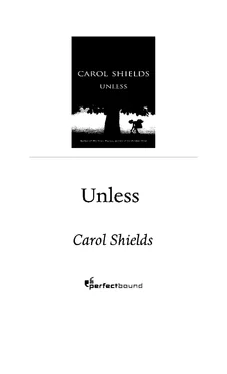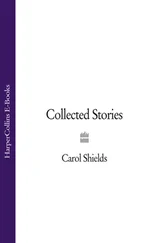Carol Shields - Unless
Здесь есть возможность читать онлайн «Carol Shields - Unless» — ознакомительный отрывок электронной книги совершенно бесплатно, а после прочтения отрывка купить полную версию. В некоторых случаях можно слушать аудио, скачать через торрент в формате fb2 и присутствует краткое содержание. Жанр: Современная проза, на английском языке. Описание произведения, (предисловие) а так же отзывы посетителей доступны на портале библиотеки ЛибКат.
- Название:Unless
- Автор:
- Жанр:
- Год:неизвестен
- ISBN:нет данных
- Рейтинг книги:4 / 5. Голосов: 1
-
Избранное:Добавить в избранное
- Отзывы:
-
Ваша оценка:
- 80
- 1
- 2
- 3
- 4
- 5
Unless: краткое содержание, описание и аннотация
Предлагаем к чтению аннотацию, описание, краткое содержание или предисловие (зависит от того, что написал сам автор книги «Unless»). Если вы не нашли необходимую информацию о книге — напишите в комментариях, мы постараемся отыскать её.
Unless — читать онлайн ознакомительный отрывок
Ниже представлен текст книги, разбитый по страницам. Система сохранения места последней прочитанной страницы, позволяет с удобством читать онлайн бесплатно книгу «Unless», без необходимости каждый раз заново искать на чём Вы остановились. Поставьте закладку, и сможете в любой момент перейти на страницу, на которой закончили чтение.
Интервал:
Закладка:
5. I then wrote a commissioned pamphlet for a series put out by a press calling itself Encyclopédie de l’art. The press produced tiny, hold-in-the-hand booklets, each devoted to a single art subject, covering everything from Braque to Calder to Klee to Mondrian to Villon.
The editor in New York, operating out of a phone booth it seemed to me, and knowing nothing of my ignorance, had stumbled on my short story “Icon” and believed me to be an expert on the subject. He asked for three thousand words for a volume (volumette, really) to be called Russian Icons, published finally in 1989. It took me a whole year to do, what with Tom and the three girls, and the house and garden and meals and laundry and too much inwardness. They published my “text,” such a cold, jellied word, along with a series of coloured plates, in both English and French (I did the French as well) and paid me four hundred dollars. I learned all about the schools of Suzdal and Vladimir and what went on in Novgorod (a lot) and how images of saints made medieval people quake with fear. To my knowledge, the book was never reviewed, but I can read it today without shame. It is almost impossible to be pseudo when writing about innocent paintings that obey no rules of perspective and that are done on slabs of ordinary wood.
6. I lost a year after this, which I don’t understand, since all three girls had started school, though Natalie was only in morning kindergarten. I think I was too busy thinking about the business of being a writer, about being writerly and fretting over whether Tom’s ego was threatened and being in Danielle’s shadow, never mind Derrida, and needing my own writing space and turning thirty-five and feeling older than I’ve ever felt since. My age — thirty-five — shouted at me all the time, standing tall and wide in my head, and blocking access to what my life afforded. Thirty-five never sat down with its hands folded. Thirty-five had no composure. It was always humming mean, terse tunes on a piece of folded cellophane. (“I am composed,” said John Quincy Adams on his deathbed. How admirable and enviable and beyond belief; I loved him for this.)
This anguish of mine was unnecessary; Tom’s ego was unchallenged by my slender publications. He turned out to be one of those men we were worried about in the seventies and eighties, who might shrivel in acknowledgment of his own insignificance. Ordinary was what he wanted, to be an ordinary man embedded in a family he loved. We put a skylight in the box room, bought a used office desk, installed a fax and a computer, and I sat down on my straight-from-a-catalogue Freedom Chair and translated Danielle Westerman’s immense Les femmes et le pouvoir, the English version published in 1992, volume two of her memoirs. In English the title was changed to Women Waiting, which only makes sense if you’ve read the book. (Women possess power, but it is power that has yet to be seized, ignited, and released, and so forth.) This time no one grumped about my translation. “Sparkling and full of ease,” the Globe said, and the New York Times went one better and called it “an achievement.”
“You are my true sister,” said Danielle Westerman at the time of publication. Ma vraie soeur. I hugged her back. Her craving for physical touch has not slackened even in her eighties, though nowadays it is mostly her doctor who touches her, or me with my weekly embrace, or the manicurist. Dr. Danielle Westerman is the only person I know who has her nails done twice a week, Tuesday and Saturday (just a touch-up), beautiful long nail beds, matching her long quizzing eyes.
7. I was giddy. All at once translation offers were arriving in the mail, but I kept thinking I could maybe write short stories, even though our Glenmar group was dwindling, what with Emma taking a job in Newfoundland, Annette getting her divorce, and Gwen moving to the States. The trouble was, I hated my short stories. I wanted to write about the overheard and the glimpsed, but this kind of evanescence sent me into whimsy mode, and although I believed whimsicality to be a strand of the human personality, I was embarrassed at what I was pumping into my new Apple computer, sitting there under the clean brightness of the skylight. Pernicious, precious, my moments of recognition. Ahah! — and then she realized; I was so fetching with my “Ellen was setting the table and she knew tonight would be different.” A little bug sat in my ear and buzzed: Who cares about Ellen and her woven placemats and her hopes for the future?
I certainly didn’t care.
Because I had three kids, everyone said I should be writing kiddy lit, but I couldn’t find the voice. Kiddy lit screeched in my brain. Talking ducks and chuckling frogs. I wanted something sterner and more contained as a task, which is how I came to write Shakespeare and Flowers (San Francisco: Cyclone Press, 1994). The contract was negotiated before I wrote one word. Along came a little bundle of cash to start me off, with the rest promised on publication. I thought it was going to be a scholarly endeavour, but I ended up producing a wee “giftie” book. You could send this book to anyone on your list who was maidenly or semi-academic or whom you didn’t know very well. Shakespeare and Flowers was sold in the kind of outlets that stock greeting cards and stuffed bears. I simply scanned the canon and picked up references to, say, the eglantine ( A Midsummer Night’s Dream ) or the blackberry ( Troilus and Cressida ) and then I puffed out a little description of the flower, and conferenced on the phone (twice) with the illustrator in Berkeley, and threw in lots of Shakespearean quotes. A sweet little book, excellent slick paper, US$12.95. At sixty-eight pages it fits in a small mailer. Two hundred thousand copies, and still selling, though the royalty rate is scandalous. They’d like me to do something on Shakespeare and animals, and I just might.
8. Eros: Essays, by Danielle Westerman, translation by Reta Winters, hastily translated — everything was hasty in those days, everything still is — and published in 1995. Hugely successful, after a tiny advance. We put the dog in a kennel, and Tom and I and the girls took the first translation payment and went to France for a month, southern Burgundy, a village called La Roche-Vineuse, where Danielle had grown up, halfway between Cluny and Mâcon, red-tiled roofs set in the midst of rolling vineyards, incandescent air. Our rental house was built around a cobbled courtyard full of ancient roses and hydrangeas. “How old is this house?” we asked the neighbours, who invited us in for an aperitif. “Very old” was all we got.
The stone walls were two feet thick. The three girls took tennis lessons at l’école d’été. Tom went hacking for trilobites, happy under the French sun, and I sat in a wicker chair in the flower-filled courtyard, shorts and halter and bare feet, a floppy straw hat on my head, reading novels day after day, and thinking: I want to write a novel. About something happening.
About characters moving against a “there.” That was what I really wanted to do.
Looking back, I can scarcely believe in such innocence. I didn’t think about our girls growing older and leaving home and falling away from us. Norah had been a good, docile baby and then she became a good, obedient little girl. Now, at nineteen, she’s so brimming with goodness that she sits on a Toronto street corner, which has its own textual archaeology, though Norah probably doesn’t know about that. She sits beneath the lamppost where the poet Ed Lewinski hanged himself in 1995 and where Margherita Tolles burst out of the subway exit into the sunshine of her adopted country and decided to write a great play. Norah sits cross-legged with a begging bowl in her lap and asks nothing of the world. Nine-tenths of what she gathers she distributes at the end of the day to other street people. She wears a cardboard sign on her chest: a single word printed in black marker — GOODNESS.
Читать дальшеИнтервал:
Закладка:
Похожие книги на «Unless»
Представляем Вашему вниманию похожие книги на «Unless» списком для выбора. Мы отобрали схожую по названию и смыслу литературу в надежде предоставить читателям больше вариантов отыскать новые, интересные, ещё непрочитанные произведения.
Обсуждение, отзывы о книге «Unless» и просто собственные мнения читателей. Оставьте ваши комментарии, напишите, что Вы думаете о произведении, его смысле или главных героях. Укажите что конкретно понравилось, а что нет, и почему Вы так считаете.












